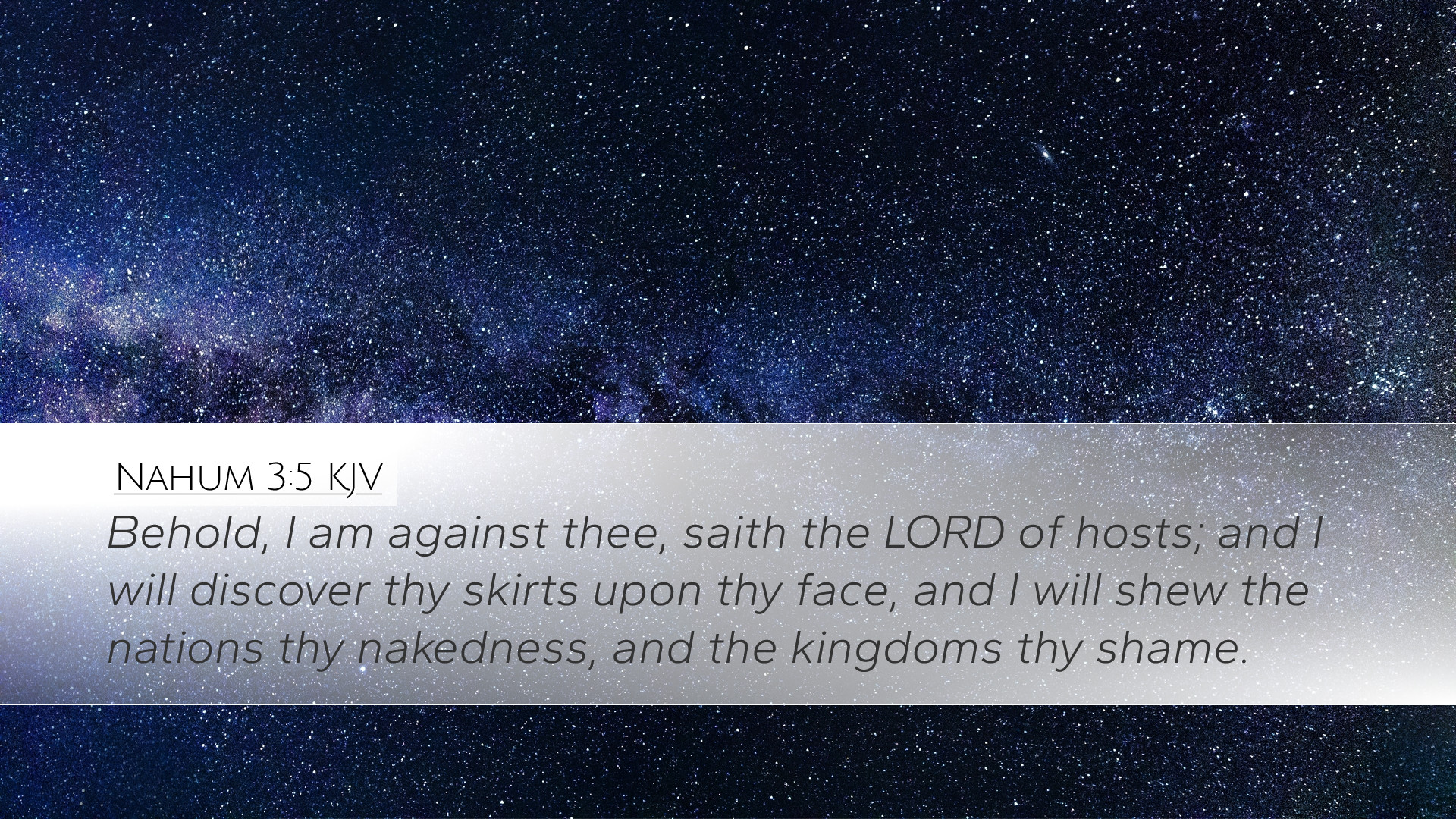Old Testament
Genesis Exodus Leviticus Numbers Deuteronomy Joshua Judges Ruth 1 Samuel 2 Samuel 1 Kings 2 Kings 1 Chronicles 2 Chronicles Ezra Nehemiah Esther Job Psalms Proverbs Ecclesiastes Song of Solomon Isaiah Jeremiah Lamentations Ezekiel Daniel Hosea Joel Amos Obadiah Jonah Micah Nahum Habakkuk Zephaniah Haggai Zechariah MalachiNahum 3:5
Nahum 3:5 KJV
Behold, I am against thee, saith the LORD of hosts; and I will discover thy skirts upon thy face, and I will shew the nations thy nakedness, and the kingdoms thy shame.
Nahum 3:5 Bible Commentary
Commentary on Nahum 3:5
Verse: Nahum 3:5 (ESV): "Behold, I am against you, declares the Lord of hosts, and will lift up your skirts over your face, and I will make nations look at your nakedness and kingdoms at your shame."
Introduction
The book of Nahum presents a vivid prophetic message directed towards Nineveh, the capital of the Assyrian Empire. As one of the Minor Prophets, Nahum's message is centered on God's judgment against this city for its violence and idolatry. In Nahum 3:5, God declares His opposition to Nineveh, using powerful and evocative imagery.
Contextual Analysis
This verse occurs within a broader indictment of Nineveh's sins. The Assyrians were notorious for their brutality and oppression. Thus, Nahum’s message is not only one of impending judgment but also one of vindication for the people of Judah who had suffered under Assyrian oppression.
Theological Themes
- Divine Judgment: The declaration “I am against you” signifies a direct confrontation with the forces of evil and oppression. According to Matthew Henry, this assertion demonstrates God’s sovereign control over the nations and His commitment to justice.
- Shame and Humiliation: The imagery of lifting up skirts represents a profound humiliation. Adam Clarke notes that in the context of ancient Near Eastern culture, exposure was a sign of disgrace.
- Universal Implications: The mention of “nations” and “kingdoms” reflects the universal scope of God’s judgment. Albert Barnes underscores that the fate of Nineveh serves as a warning to other nations about the consequences of turning away from God.
Exegetical Insights
This verse employs metaphoric language to convey the seriousness of God's judgment. The phrase "lift up your skirts" is a metaphorical expression indicating shame. The Hebrew term used here carries implications of vulnerability and dishonor. The overall message emphasizes that God's justice will not be ignored or delayed, historian and exegete Adam Clarke suggests.
Implications for Contemporary Readers
For modern readers, this verse serves as a sobering reminder of the consequences of societal sin. It raises questions about righteousness and the character of nations. Pastors and theologians can reflect on the nature of God's justice, emphasizing that it is both an act of wrath against sin and a declaration of His ultimate authority over all nations.
Pastoral Reflection
In preaching or teaching from Nahum 3:5, pastors can focus on God's unwavering stance against injustice. This passage can help motivate believers to reflect on their own lives and the institutions they are part of, urging them to align more closely with God’s righteousness.
Conclusion
Nahum 3:5 encapsulates a profound truth about God's character in relation to sin and judgment. The prophetic warning delivered through Nahum emphasizes that no nation is beyond God's scrutiny. For students and theologians, the verse underscores the importance of understanding biblical prophecy in its historical context while drawing timeless principles relevant for today.


